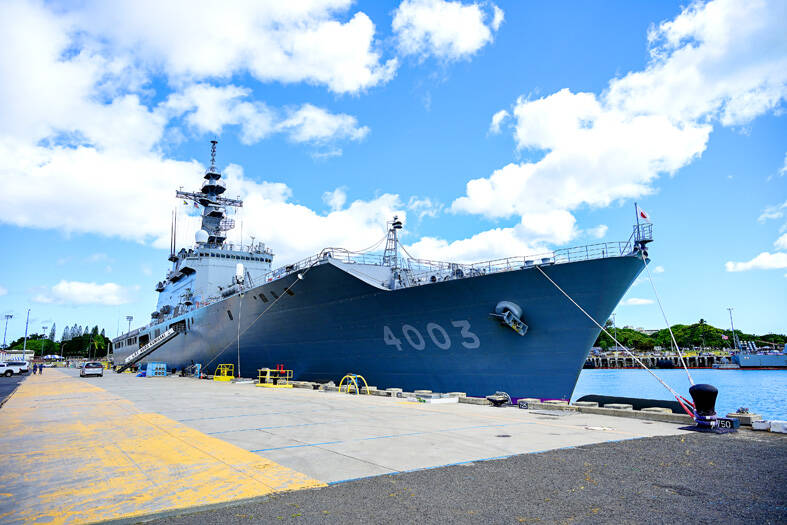A retired Japanese admiral yesterday called on the US, Japan and Taiwan to form a direct trilateral communication channel to share intelligence to jointly prevent a potential Chinese invasion of Taiwan.
Former Japanese Maritime Self-Defense Force chief of staff Tomohisa Takei told a forum in Taipei that territorial disputes in the West Pacific have intensified over the past decade as China sees territorial ownership as “an issue that can never be conceded.”
Since Chinese President Xi Jinping (習近平) assumed power, China has made it clear that the Diaoyutai Islands (釣魚台), also known as Senkaku Islands in Japanese, and Taiwan are “at the very core of Chinese core interests,” Takei said.

Photo: CNA
“From this point of view, Japan and Taiwan are inseparably linked in many ways. In particular, the two are in the same boat when it comes to national security,” he said.
Taiwan, Japan and China all claim sovereignty over the Diaoyutai Islands in the East China Sea.
However, the Japanese government was less aware of Taiwan’s geopolitical value to it or the connections between the two countries, Takei said.
“First, what would happen if Taiwan were somehow integrated into China? And second, if Japan and the US fail to defend Taiwan, even in a gray zone situation, a completely different world will emerge in East Asia,” he said.
To prevent such a scenario, the retired admiral said Tokyo needed to strengthen its military cooperation with the US and continue to beef up its own defense capabilities amid China’s continuous defense build-up.
In terms of the US-Japan alliance, Tokyo also needs to elevate its security cooperation with Washington, he said.
He said there should be a “direct triangle approach” between Taiwan and Japan, with the US in the middle.
The Taiwan-US-Japan triangle framework should include information sharing and promote closer coordination on various fronts, Takei said.
He also suggested that Japan continue to strengthen its defense capabilities to complement US attempts to extend its arms posture and its deterrence.
At the same forum, Rick Waters, a former US deputy assistant secretary at the US Department of State’s Bureau of East Asian and Pacific Affairs, said Beijing, including the China Coast Guard, has been very active in deploying “gray zone” tactics in the Indo-Pacific region over the past decade.
The world has witnessed “this emergence of a stronger China, with composite national power now being applied through a multidimensional gray-zone strategy and an arc that spans from India through the South China Sea and the Taiwan Strait, into the East China Sea,” said Waters, now the managing director of Eurasia Group’s China practice.
Beijing’s growing threat has led countries in the region to stand closer, leading to the reshaping of the US-Japan defense alliance to include South Korea and the Philippines, he said.
“So we are starting to see them rely more on each other,” he said.
The issue of Taiwan Strait security also affects others around the globe, which is why the G7, NATO and the EU have over the past few years begun to talk more about the importance of peace and stability and upholding these norms in the Indo-Pacific region, he said.
The two speakers made their remarks during the morning session of the Ketagalan Forum, a government-founded annual international seminar with a focus on security issues in the Indo-Pacific region.

An essay competition jointly organized by a local writing society and a publisher affiliated with the Chinese Communist Party (CCP) might have contravened the Act Governing Relations Between the People of the Taiwan Area and the Mainland Area (臺灣地區與大陸地區人民關係條例), the Mainland Affairs Council (MAC) said on Thursday. “In this case, the partner organization is clearly an agency under the CCP’s Fujian Provincial Committee,” MAC Deputy Minister and spokesperson Liang Wen-chieh (梁文傑) said at a news briefing in Taipei. “It also involves bringing Taiwanese students to China with all-expenses-paid arrangements to attend award ceremonies and camps,” Liang said. Those two “characteristics” are typically sufficient

A magnitude 5.9 earthquake that struck about 33km off the coast of Hualien City was the "main shock" in a series of quakes in the area, with aftershocks expected over the next three days, the Central Weather Administration (CWA) said yesterday. Prior to the magnitude 5.9 quake shaking most of Taiwan at 6:53pm yesterday, six other earthquakes stronger than a magnitude of 4, starting with a magnitude 5.5 quake at 6:09pm, occurred in the area. CWA Seismological Center Director Wu Chien-fu (吳健富) confirmed that the quakes were all part of the same series and that the magnitude 5.5 temblor was

The brilliant blue waters, thick foliage and bucolic atmosphere on this seemingly idyllic archipelago deep in the Pacific Ocean belie the key role it now plays in a titanic geopolitical struggle. Palau is again on the front line as China, and the US and its allies prepare their forces in an intensifying contest for control over the Asia-Pacific region. The democratic nation of just 17,000 people hosts US-controlled airstrips and soon-to-be-completed radar installations that the US military describes as “critical” to monitoring vast swathes of water and airspace. It is also a key piece of the second island chain, a string of

The Central Weather Administration has issued a heat alert for southeastern Taiwan, warning of temperatures as high as 36°C today, while alerting some coastal areas of strong winds later in the day. Kaohsiung’s Neimen District (內門) and Pingtung County’s Neipu Township (內埔) are under an orange heat alert, which warns of temperatures as high as 36°C for three consecutive days, the CWA said, citing southwest winds. The heat would also extend to Tainan’s Nansi (楠西) and Yujing (玉井) districts, as well as Pingtung’s Gaoshu (高樹), Yanpu (鹽埔) and Majia (瑪家) townships, it said, forecasting highs of up to 36°C in those areas